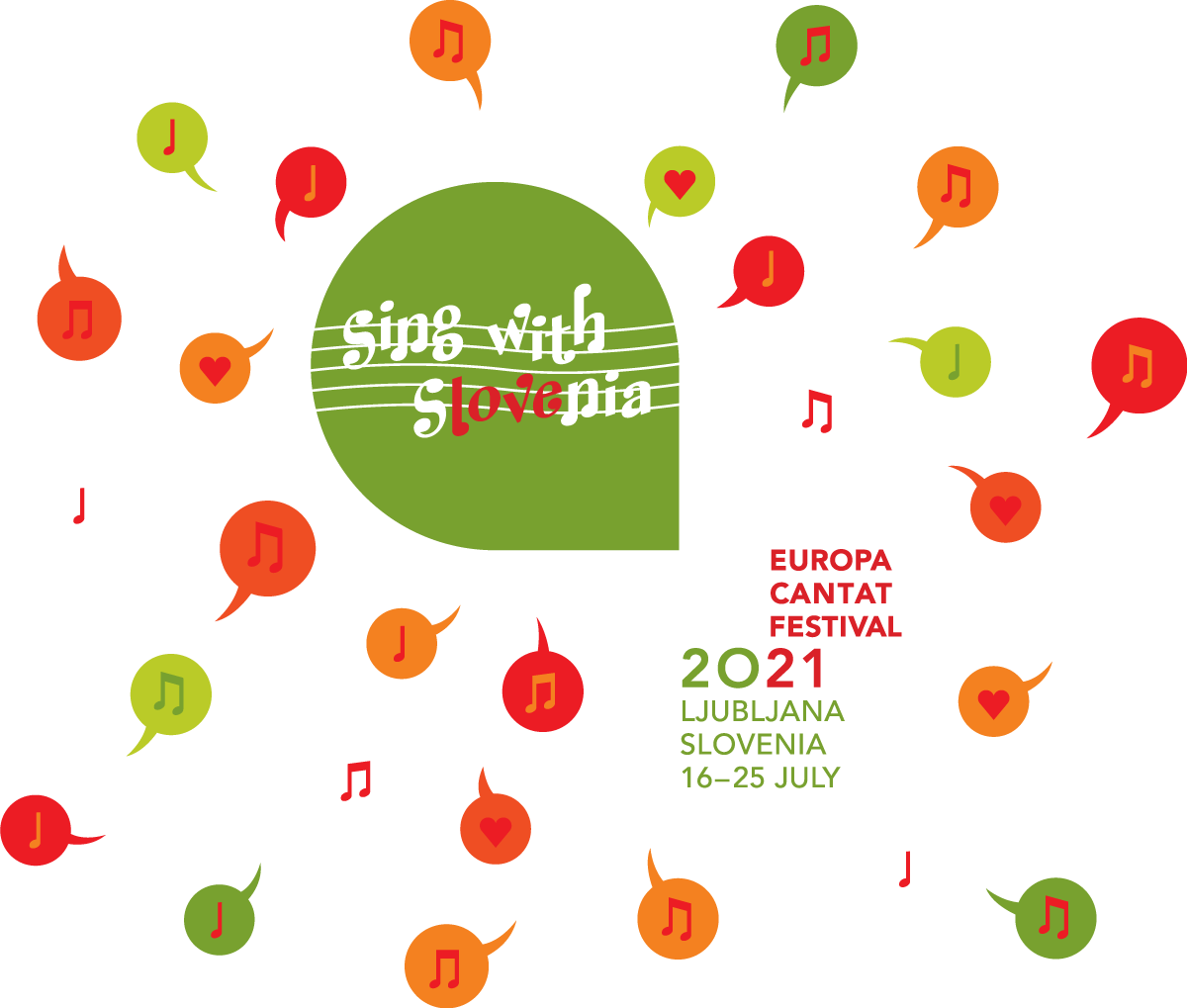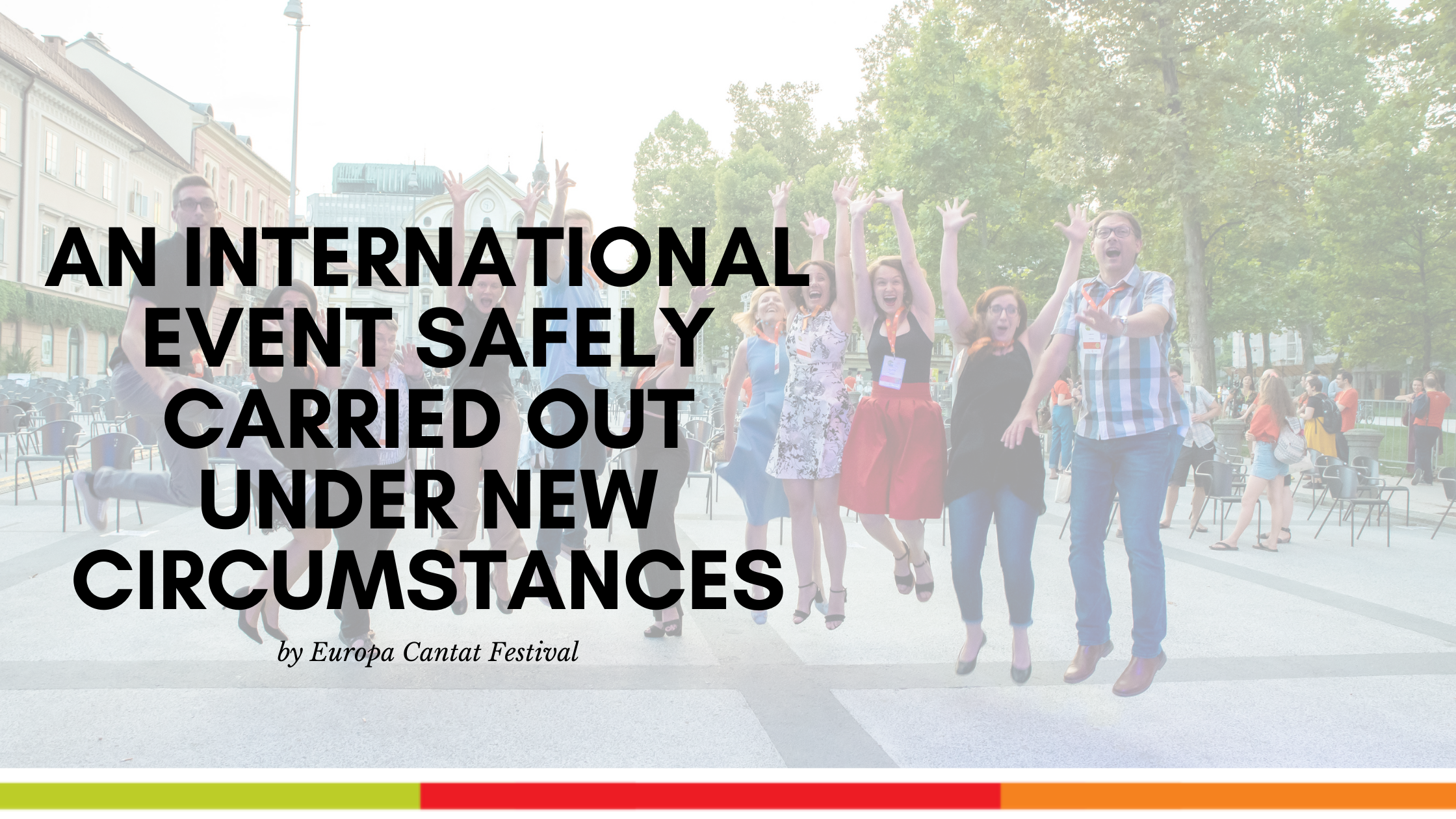
Choral Festival Europa Cantat 2021 – model of good practice: an international event safely carried out under new circumstances
An interview with Mihela Jagodic, the Festival programme manager, upon the conclusion of this year’s largest choral event in Europe
Published on August 5, 2021 in Naši zbori, Slovenian online choral magazine
Author: Branka Kljun
Translation to English: Tadeja Petrovčič Jerina
Europe’s largest choral festival came to a successful conclusion on 22 July 2021 in Ljubljana. Those who have experienced the festival in previous years, whether in Pécs, Hungary, Turin, Italy, or in another cultural capital before, will be the best judge of what this year’s festival has brought and what it has deprived us – lovers of choral singing – of. Mihela Jagodic the producer for choral activities at the Public Fund for Cultural Activities of the Republic of Slovenia and the person who is most responsible for the fact that this year’s largest European choral festival took place right here in Slovenia, and more specifically in the capital Ljubljana, is undoubtedly among those who know this best.
When have you encountered this festival over the past years and what attracted you to it the most?
I have attended five Europa Cantat festivals: for the first time in Mainz in 2006, then in Utrecht, Turin, Pécs and Tallinn. I like the Europa Cantat Festival because it offers a musical counterbalance to competitions and professional events aimed primarily at choral professionals or the most demanding audiences. The festival caters for them too, but at the same time it focuses on the singers and the broad range of things on offer for them. It brings together singing enthusiasts and professionals from all over the world (in ordinary years, of course), is the most massive international event of its kind, bringing together thousands of singing enthusiasts, and at the same time is a fantastic promotion of the host country.
This year’s festival was held under particular circumstances. When you took the initiative five years ago and were chosen to organise this year’s event in 2017, you had no idea what a challenge you were up against. Even when you started preparing for this large and demanding international event, you had no idea what you were in for. It only became clear to you when the programme concept had already been drawn up, when the first agreements had already been made and a team of experts from various fields had already been formed to masterfully set up and carry out the event as a promotion of Slovenia during its Presidency of the Council of the European Union.
Everything was on schedule until March 2020, when the world stopped for the first time. We stopped for a moment, but immediately resumed, because “luckily, the festival is not until next year”. Optimistically, without any changes, we planned the festival until the end of the year, with the outlook on vaccines and the end of the epidemic pointing to this spring. But when applications closed in February this year, we started to wonder about it all …
Normalcy was drifting further and further away. The officially set conditions for the green phase, which we urgently needed for planning, were not in place, and despite a detailed plan for adjusting rehearsals, we could not provide the internationally recognised Slovenian choral “representation” with the special status they would have needed to prepare for the festival in an appropriate way.
We started to prepare scenarios tailored to the situation, setting up and testing each one. The first adapted scenario was to divide the festival into two four-day parts. No participant would stay with us for more than half of the festival, to minimise the possibility of infection. At the same time, we provided a sufficient number of huge rehearsal venues which would allow the necessary safety distance between singers; the venues would also be used in sequence rather than simultaneously. In addition, the programmes had to be adjusted with the conductors, as the number of rehearsals for the longer ateliers had to be reduced accordingly.
Once we had reassigned the 2600 singers to balanced singing ensembles, the uncertainties of travel conditions, accommodation, quarantines began to emerge – with every cancellation of a participant, we would have atelier singing ensembles being torn down, infected persons spending time locked in hotels instead of rehearsing.
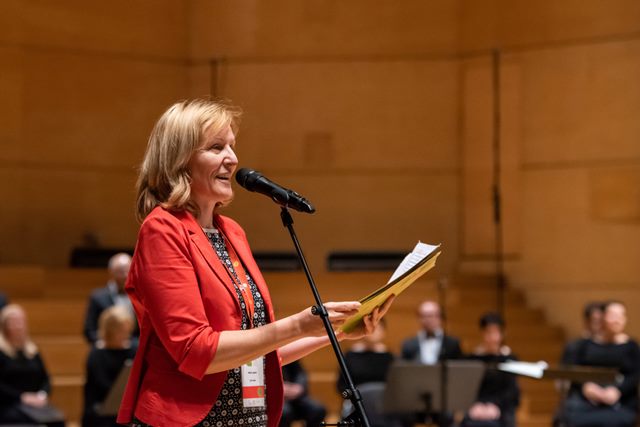
In the end, the scenario you know was the one that prevailed, but our fear of possible problems and complications was only allayed when the last participant had left, when we – the core team – sat down, looked at each other and realised: “Oh, we did it!”
We went for a new scenario – with only Slovenians participating, because most of them were not in danger of losing money for hotels, air tickets, etc., and in case of quarantine they could return home immediately. The ateliers would not be much smaller, but they would be less filled and thus much more uncertain if individual singers could not make it. In addition, only 800 of the 1500 (Slovenian) participants could still be enroled, and in many cases it might happen that only part of the choir registered for the festival could be accepted; thereby we would literally be ‘breaking up’ the choirs instead of bringing them together.
Atelier leaders also started to contact us, unsure whether they would be able to travel and rehearse safely, as it was unclear whether they would be able to get vaccinated by the summer. They were also worried whether the singers would be able to hear each other in the huge venue and thus prepare adequately for the performance. This scenario had so many critical points that it was simply not sustainable. And so we went on to the new one: a series of concerts by invited groups and those Slovenian choirs which, a month and a half before the beginning of the festival, still had so much hope and defiance that they decided to try to stay. All the educational and promotional content was up in the air till, at one point, the idea of a “television” arose, the idea of a TV channel in fact, with a series of lectures and interesting videos…
All three scenarios were, of course, accompanied by all the logistical problems, changes in bookings, contracts, hotel accommodation, catering planning, festival length, schedules, recordings, reactions of interested sponsors, etc.
In the end, the scenario you know was the one that prevailed, but our fear of possible problems and complications was only allayed when the last participant had left, when we – the core team – sat down, looked at each other and realised: “Oh, we did it!”
The organising team was in fact a crew of 150 people, who created an unforgettable musical event for lovers of choral singing during the week of 17-22 July.
Indeed, the core team was formed of 11 people since last year; in addition to Urška Bittner Pipan as the organisational manager and myself as the festival’s programme manager, there were also 9 of my closest collaborators in the music, festival, production and communication offices. During the festival we were then joined by 20 young people from the international Young Event Management Programme (YEMP), 4 colleagues from the European Choral Association head office in Bonn, 25 additional JSKD colleagues, Joži Vovk, the head of EC music office and then the head of ECTV was joined by 3 experts and 17 students from the University of Ljubljana’s Academy of Theatre, Radio, Film and Television, who designed the ECTV programme. 60 volunteers of all ages from Slovenia and 30 from abroad also helped. Quite a team, which made sure that everything ran according to the programme, without any complications, with a great deal of care and a sense of well-being for EC participants and our audience.
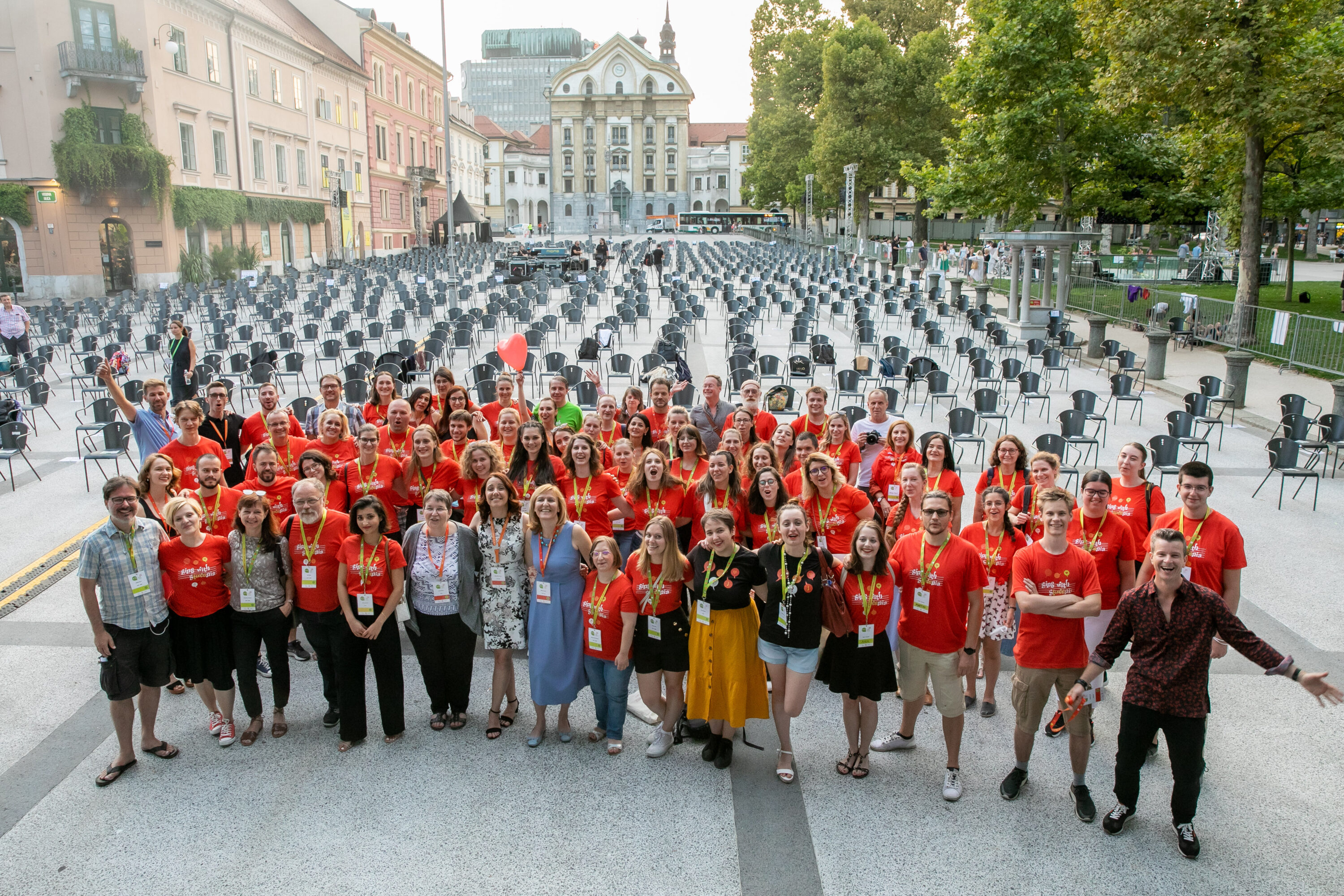
A series of live concerts by excellent international ensembles, concerts that brought together young singers from different countries, concerts that presented Slovenia abroad in the most interesting, high-quality and original way, and ECTV, which replaced all the ateliers, study tours, lectures, etc. that had always been held live, bringing together and connecting thousands of singers from different countries. New situations, new forms of work – there is no doubt you can be satisfied with the result in these new circumstances.
Right up to the beginning of the festival, we were imagining what the EC festival would have been like if the conditions had been normal, as they have been during the other 20 EC festivals, from the first one in 1961 in Passau, Germany, to the last one in 2018 in Tallinn, Estonia. We all know how the concerts would have been, how lively the city would have become, how many people would have come to Ljubljana, and what kind of energy it would have brought along with it. We know exactly how it should have been, and when I look at our – the reduced version, that was possible to realise in the given circumstances – today, I remember how frustrating it was during the preparations every time we had to cut off some more of the programme. But considering that no choral festival has been held anywhere in the world since the outbreak of the coronavirus, our festival was actually quite a miracle. The atmosphere at the concerts, all the applause and reactions to a beautifully sung song showed how much it means to people to be able to be at the “live” concerts, and how much we all have been missing the singing. We are experiencing it much more intensely now than before, when it used to be something normal, something ordinary.
We have organised a series of excellent concerts by renowned Slovenian and international vocal groups, as well as educational events that has broadened the horizons, improved and enriched the knowledge of the participants. In the light of the epidemiological constraints, which were still unclear at the time of last preparations, we came up with a last-minute solution: a festival ECTV, on which all the ateliers, webinars, presentations of choral literature, interviews, etc., were transferred – content that was freely accessible to anyone. We looked for a person who was able to produce something like this and who also opened our eyes to what could be put into this form of media. This happened to be Aljaž Bastič, an experienced singer (he sang in the World Youth Choir), choirmaster and film director working at RTV Slovenia. We had no idea how much work it would involve and how complicated the process would be to broadcast the festival TV every day from 9.00 to 18.00, i.e. 54 hours of broadcasting within 6 days.
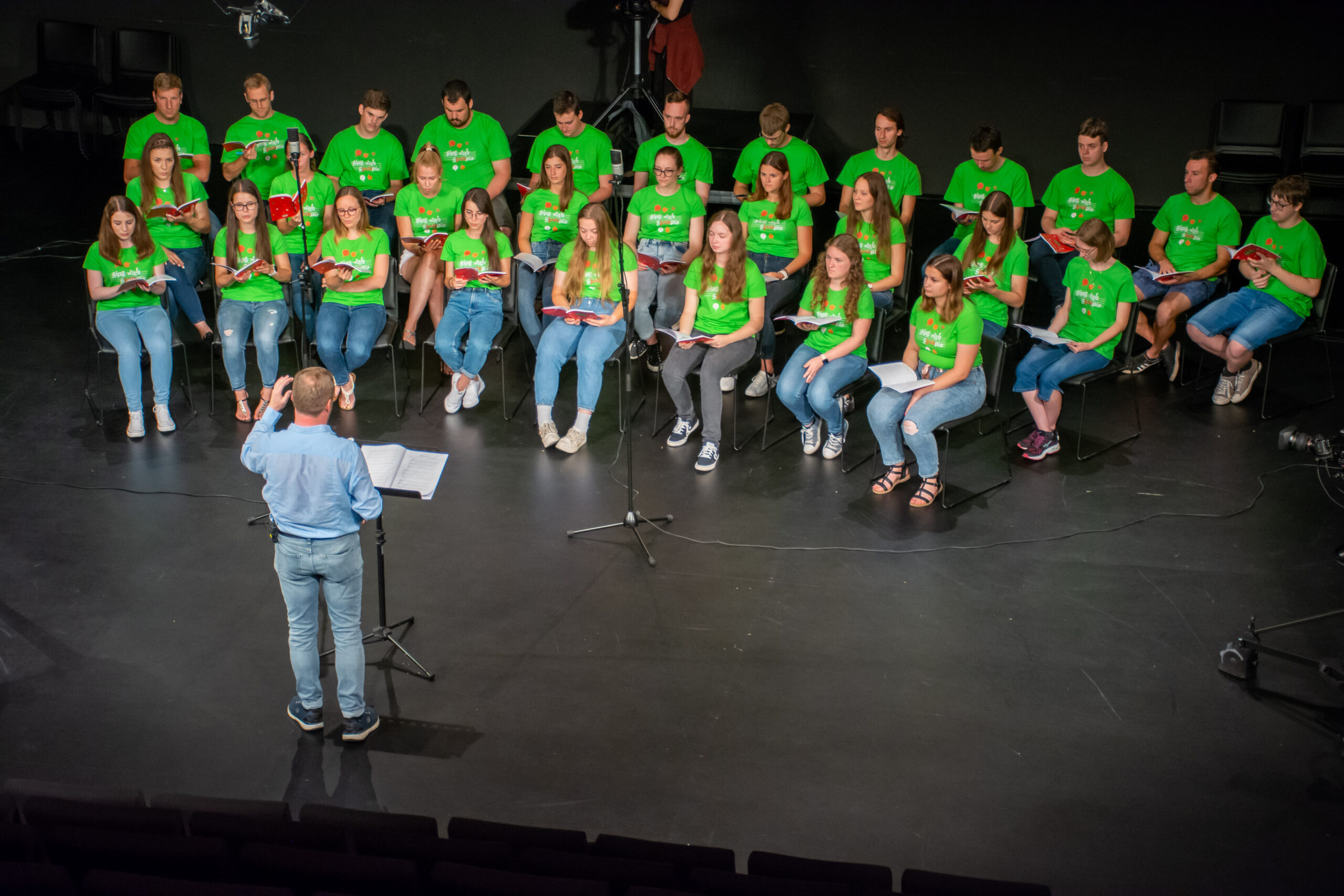
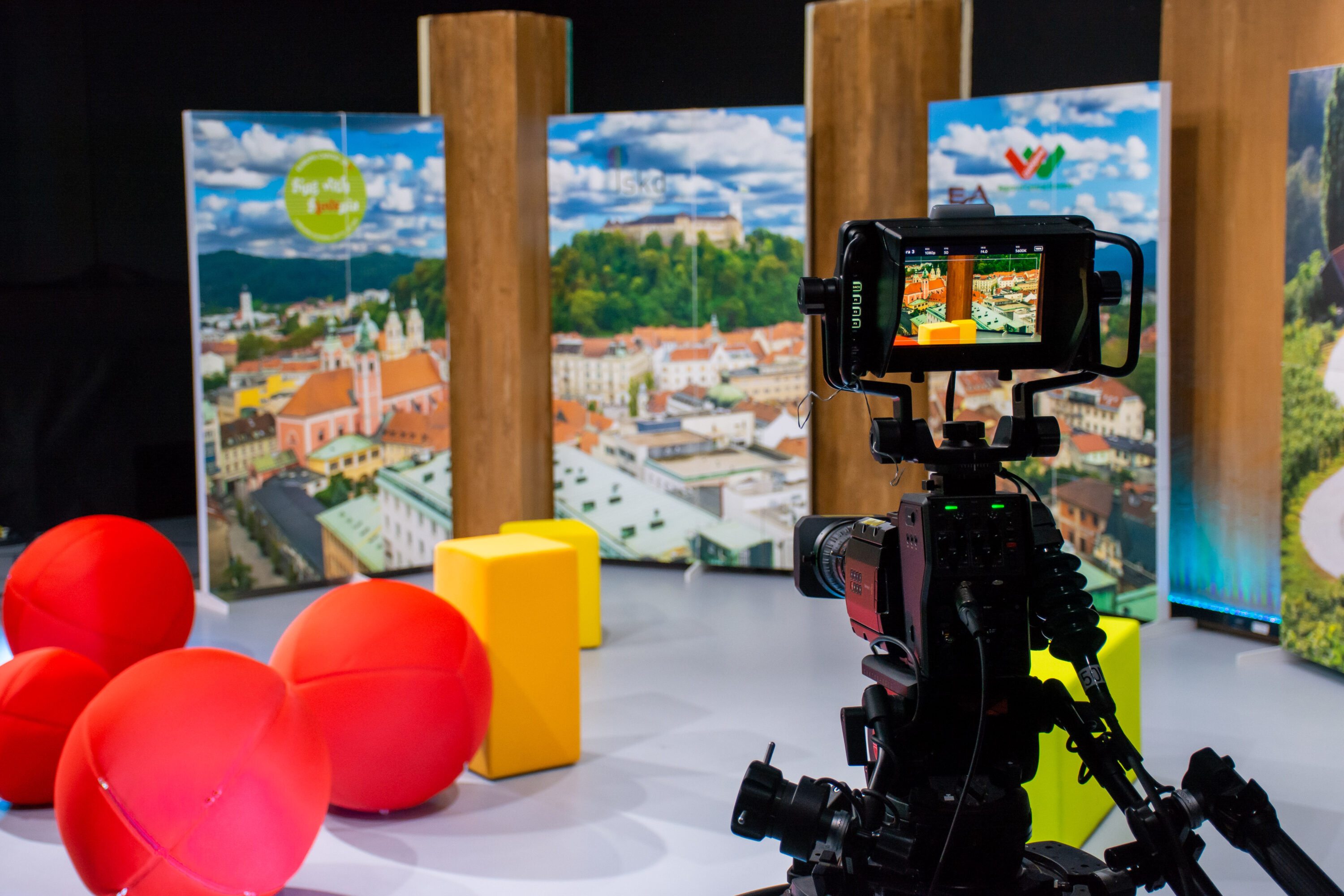
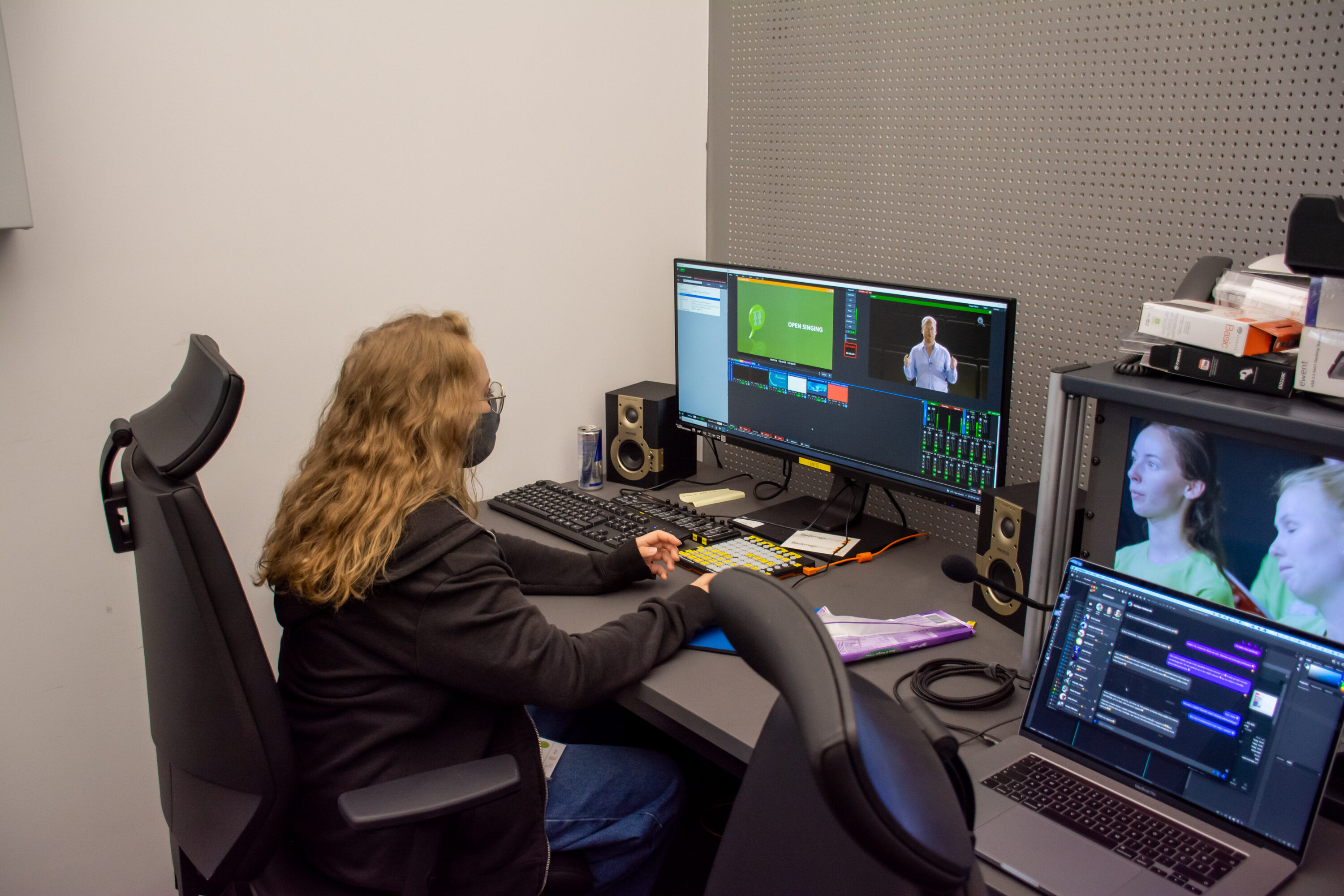
So that was scenario D, maybe even E. But what would it have looked like in version A?
I don’t know where to start… The participation of most of the active singers in the ateliers, which are the essence of the Europa Cantat Festival, has been cancelled. There would have been from 60 to 150 people singing together in each atelier for 4, 6 or 8 days. They would have given 32 final concerts of all possible music styles, from folk to pure classical, with orchestras, baroque instruments, dance … Since we did not get the regulations for the green phase in time, we have of course decided that we cannot take that risk. If, at the very last moment, the circumstances were not suitable, we would have had to cancel all the participations only a few days before the festival, and this would have meant huge financial losses (air tickets, hotel accommodation, transport, venue bookings, etc.), costs that would have been borne both by the participants and by us, the organisers. It would have been an irresponsible decision. So we ended up with studios in the framework of the ECTV, with one choir, one bubble. We created so-called webinars, which ensured epidemiological reliability and were accessible to the widest possible audience without any direct contact.
In addition all the singers and the choirs who would have come here and taken part in the ateliers, would have had their own performances, not only in Ljubljana, but all over Slovenia. All the lectures would have been live, we would have had a study group of participants who had signed up for it and would have attended all the lectures live – they would have done a so called “study tour”. That means they would visit four or five ateliers every day, they would observe the work of different conductors, they would debate and actively participate…
What we have been able to do is more like a World Symposium for Choral Music than an Europa Cantat Festival, engaging top vocal groups but not individual singers. The basic idea of Europa Cantat would have involved a few thousand singers, but we had to settle for around 1,000 participants, which was a quite large number in these circumstances.
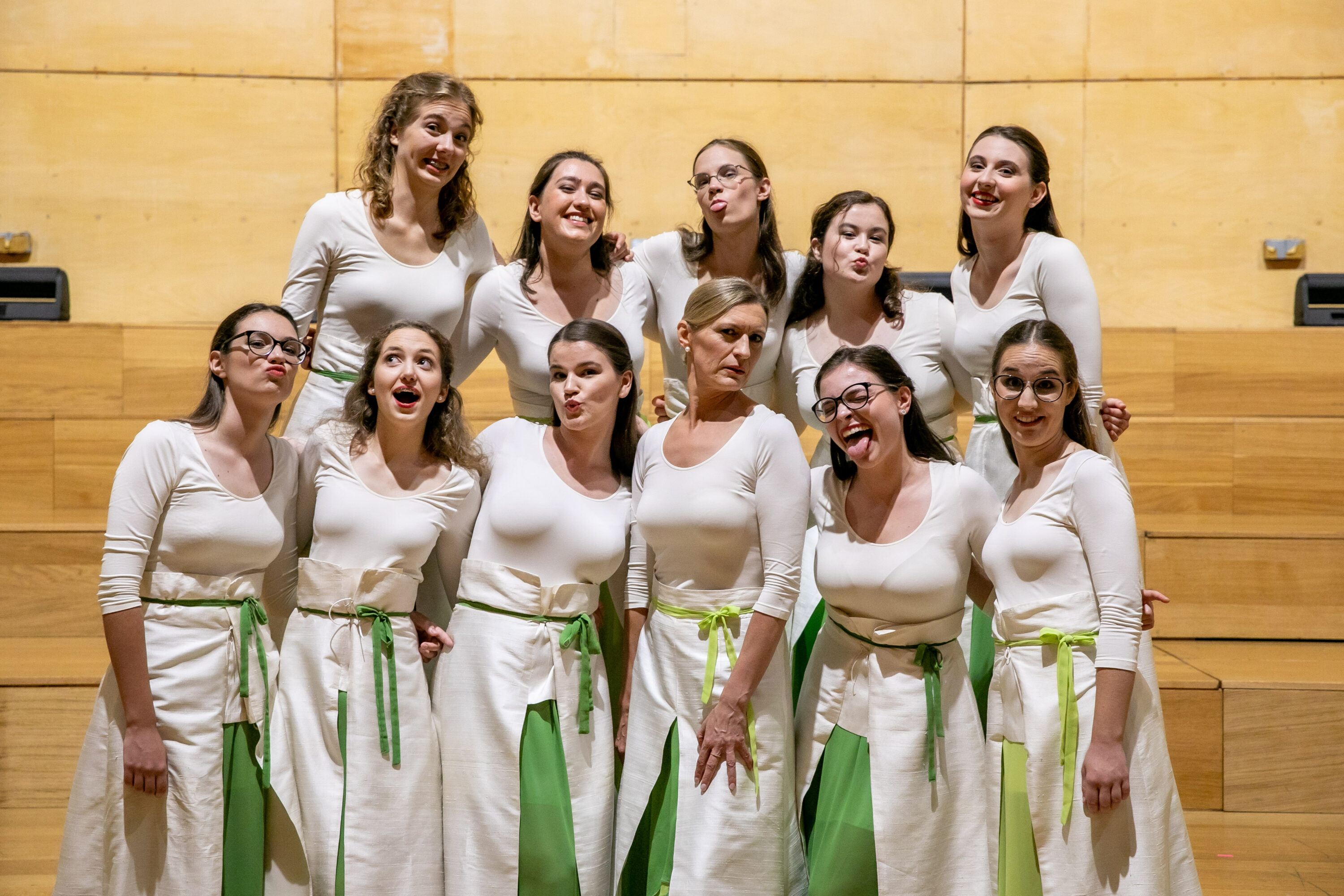
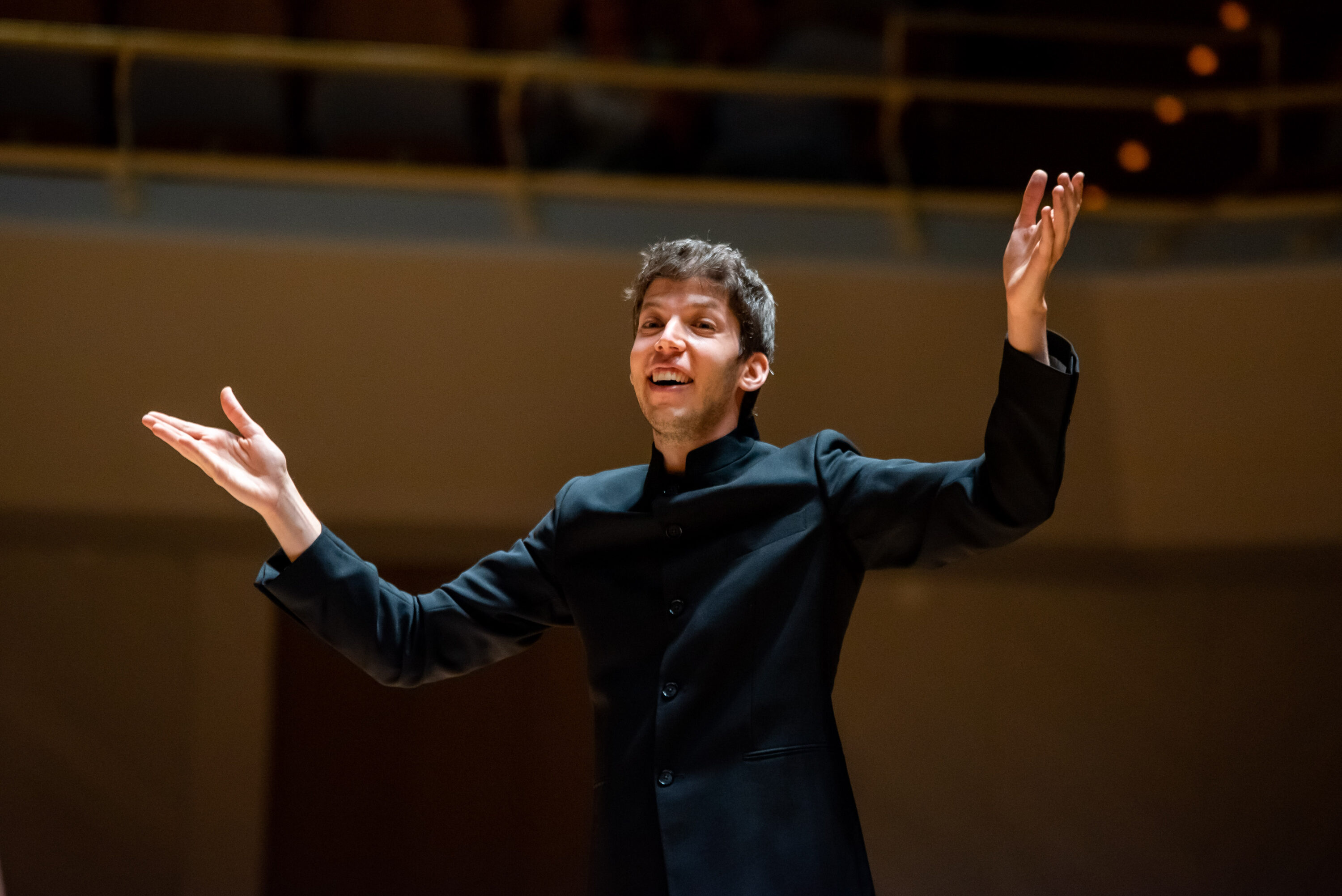
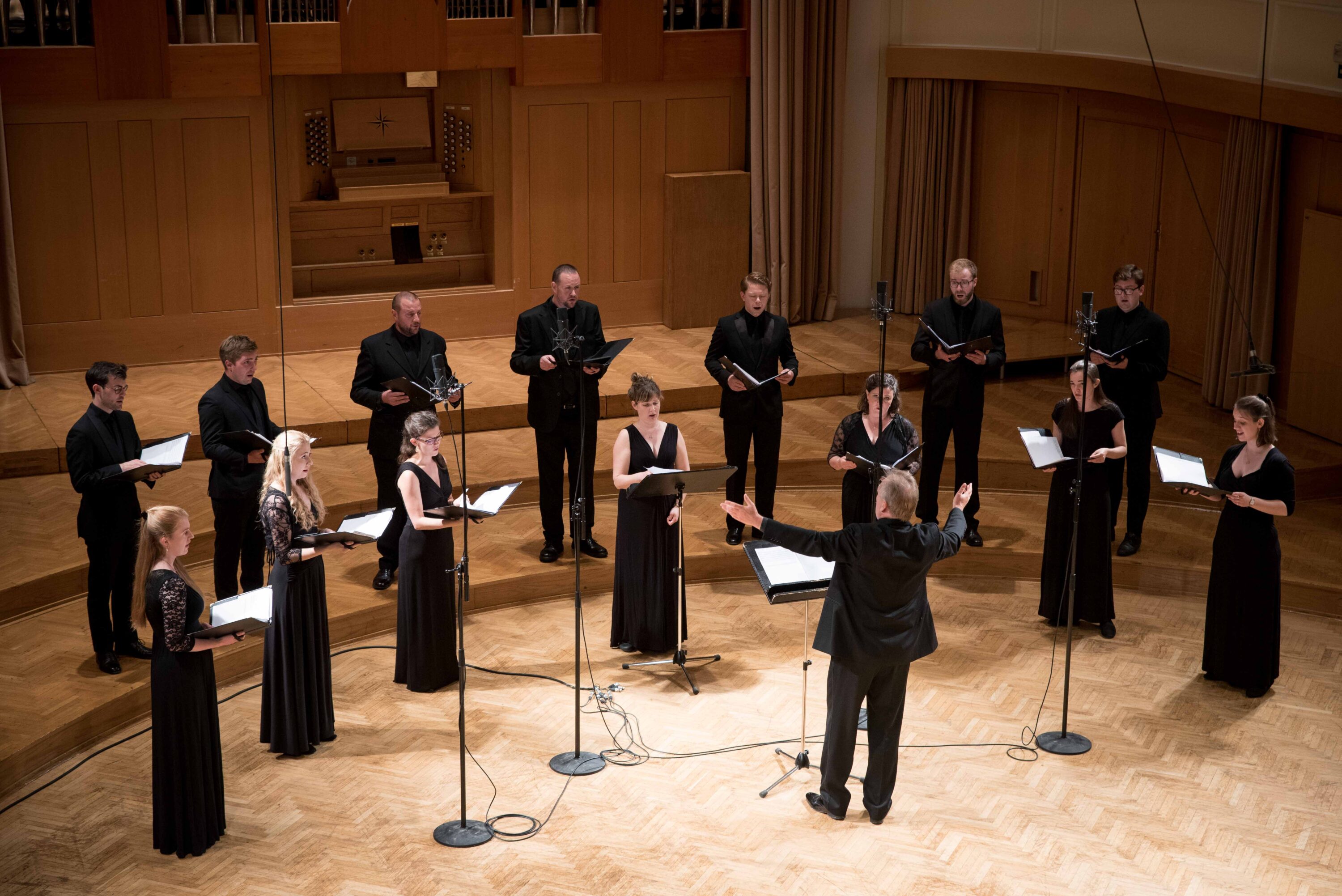
I know that a very attractive event in Hala Tivoli had to be cancelled, too …
Indeed … I think it would have been the most special of all the events of this EC festival. For the first time ever we would have combined choral music with sport in this way. The idea was to have a performance with artistic ice skaters who would perform their choreographies to live performances by the choir; they would also be on ice. This cancellation was particularly difficult because it would have been a world premiere of this type of event.
What we also had to cancel was a very nice programme where foreign participants (vocal groups or parts of choirs) would have been welcomed in the homes of the registered hosts. The singers would have prepared a pleasant singing evening for family, neighbours, friends, got to know each other, had a feast, learnt about our customs …
And how did you select the Slovenian representatives for the Sing to Slovenia concert series?
Last year already we conducted a hypothetical enquiry to gauge the interest of the best Slovenian choirs from all over Slovenia to perform in this series of concerts. In our first scenario, we had a very wide range of concert types: a performance by a 200+ united Slovenian choir with the Slovenian Philharmonic Orchestra under the direction of Tõnu Kaljuste, individual solo concerts by children’s, youth and adult choirs presenting exclusively Slovenian music, and a performance of our most internationally renowned choirs. According to the response of the choirs, we have drawn up possible combinations.
When we had to start adjusting scenarios because of the continued drift away from normal conditions, we had to decide anew what was possible to implement. We had to (re)consider the size of the concert venues, the number of choirs and orchestras, the suitability of the programmes for a possible relocation to open stages, the combinatorics of the programme selections, the concert dates in view of the shortened festival, and of course the persistant question was which of the choirs would be able to prepare to perform in front of an international audience at a level that they themselves would be satisfied with in such a short time. So, from the widest range of choirs, we ended up with the choirs that we were able to hear at the festival.
Until the very last moment we tried to ensure solo concerts to a selection of our outstanding choirs, but unfortunately in the end, for various reasons, this was not possible. I would like to take this opportunity to thank them for their availability: Maribor Academic Choir, Tone Tomšič Academic Choir of the University of Ljubljana, Carmen Manet, Chamber Choir of the Academy of Music in Ljubljana, Children’s Choir of the Fran Korun Koželjski Music School in Velenje, Children’s Choir and Youth Choir of the Nazarje Primary School, Children’s Choir and Youth Choir of the France Bevk Primary School in Tolmin, Children’s Choir and Youth Choir of RTV Slovenia.
I would also like to thank all the other invited groups who were willing to participate in the project of united choirs, which would be performed with the Slovenian Philharmonic Orchestra: Glasis Chamber Choir from Markovci, France Prešeren Kranj Academic Choir, Aglaja Girls Choir, Grudnove Šmikle Women’s Choir, Viva Brežice Mixed Choir, Ave Chamber Choir, Ipavska Chamber Choir, Orfej Chamber Choir, Vintgar Quintet, Ljubljana Madrigalists, Prosavus Mixed Choir and Elum Vocal Group from Postojna.
Nevertheless, the reactions to the festival are very positive. Those who attended the concerts live and those who followed the festival on ECTV are more than pleased. Perhaps because of the lack of such events over the past year, but probably not only for that simple reason.
The lack of choral singing is certainly one of the emotional reasons, but the other one is the immense appreciation of what the choirs that have performed here have prepared within the last month or even the last week. The Girls’ Choir of the St Stanislaus Diocesan Classical Gymnasium has put together an outstanding performance in a week of intense work, and the other choirs have not had more than a month of live rehearsals together. It is also important to keep in mind that these choirs are made up mostly of high school students, graduating seniors, students who, during this time, had the heaviest of their study commitments. I think this is one of the reasons why the audience, most of whom were singers themselves, reacted with such appreciation at their concerts.
There have been speculations why you didn’t postpone the festival for a year; the Olympics were postponed… What is the reason? Is it that nobody knows what next year will bring anyway?
The Olympics can be postponed, but not our Europa Cantat Festival. There is a lot of money spinning on the Olympics. Our funding however was partly tied to co-financing the biggest cultural project during Slovenia’s Presidency of the Council of the European Union. And because we were holding the Presidency of Europe this year and not next year, we had to spend this money this year; next year it would not be there any more. And besides we really did not know – as you say – what next year would bring. Last year, we thought we were lucky because there was a festival planned for this year (and not for the past one), but well, it turned out that we were not so lucky after all. So we did it when we could: when we had the team and the resources. Our finances depended on the decision of our government and our municipality, and had we wanted to move the event, we would have to go through both of their procedures once again to secure funding outside their ordinary two-year budget. Planning an event for three or four years ahead, as ours was – or for example as the one for the European Basketball Championships or for the Slovenian guest of honour in Frankfurt are – involves special governmental procedures that require an extraordinary commitment in every respect; and it takes at least half a year to get the response as to whether or not they are going to support the project.
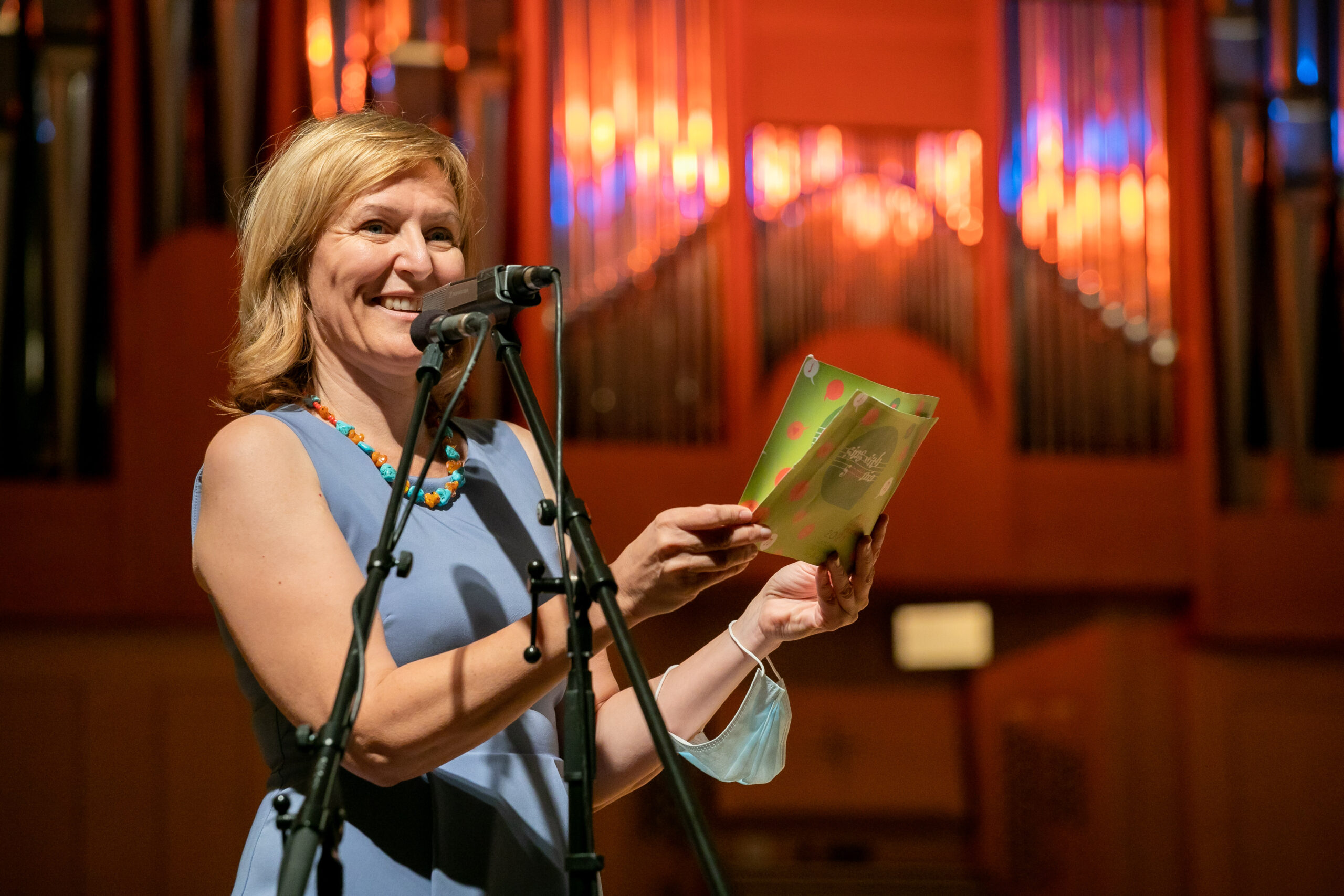
When we had to start adjusting scenarios because of the continued drift away from normal conditions, we had to decide anew what was possible to implement.
We had to (re)consider the size of the concert venues, the number of choirs and orchestras, the suitability of the programmes for a possible relocation to open stages, the combinatorics of the programme selections, the concert dates in view of the shortened festival, and of course the persistant question was which of the choirs would be able to prepare to perform in front of an international audience at a level that they themselves would be satisfied with in such a short time.
Did you finally manage to calm down when you started counting down the days to the Festival, and start thinking about the details – if details it can even be called?
The closer the Festival got, the more we trembled about the government’s upcoming decisions on health measures. Not only our government’s decisions, but also those of other governments could have complicated our organisation. First we were in the red phase and therefore problematic, then we became ‘green’ and, for example, the Catalans were ‘red’ and therefore ‘dangerous’ for us and the participants from other countries. We have been following similar complications and changes almost on a daily basis for some time now. If you imagine that EuroChoir alone is made up of singers from 20 countries – we really could not know from one week to the next whether they would be able to come or not. One of their singers from Panama had to stay in quarantine and joined the choir in Ljubljana a while later. If, for example, three tenors or five sopranos had fallen ill, then EuroChoir would not have been able to perform, we would not have been able to replace it with any substitute, and all the other singers would have been left here without the purpose for which they had come to Slovenia. We had also planned several live concerts in Slovenia with this choir, recording and so on… There was no day when no new solutions and adjustments were needed. When the Festival started, we the organisers were already mentally seriously exhausted. There were for example a lot of artists performing at the opening ceremony on Saturday, but only a couple of days before that we didn’t know if all the foreigners would all be able to come. If there had been an infection in the St. Nicholas Choir from Litija, we would have had big problems, because this choir was the backbone of the opening ceremony.
The festival is over, and we are very happy, as we have not heard of any positive covid test to this very day. All participants, singers, performers, organisers were tested every other day, even though they all arrived in Slovenia with a negative PCR test. In front of the Cankarjev dom cultural centre, where the main part of the festival took place, we had a mobile unit checking the health situation of the participants on a daily basis.
The Catalan National Youth Choir was the only choir at the Festival to perform with face masks. However, when it performed together with the Austrian and two Slovenian choirs, everyone kept their masks on during the concert.
That was agreed by all the Choirs. Catalans were already used to the masks, they did not feel comfortable without them, because that was the way that the selected choirs in Spain could work, rehearse. Given that at that time there were several thousand infections a day in Barcelona alone, this was a necessity. The joint choir included the Ljubljana Academy of Music Chamber Choir, which subsequently travelled to another festival in France, and the Ljubljana Conservatoire of Music and Ballet Chamber Choir, which after our festival gave its own concerts. We didn’t want to take any risks.
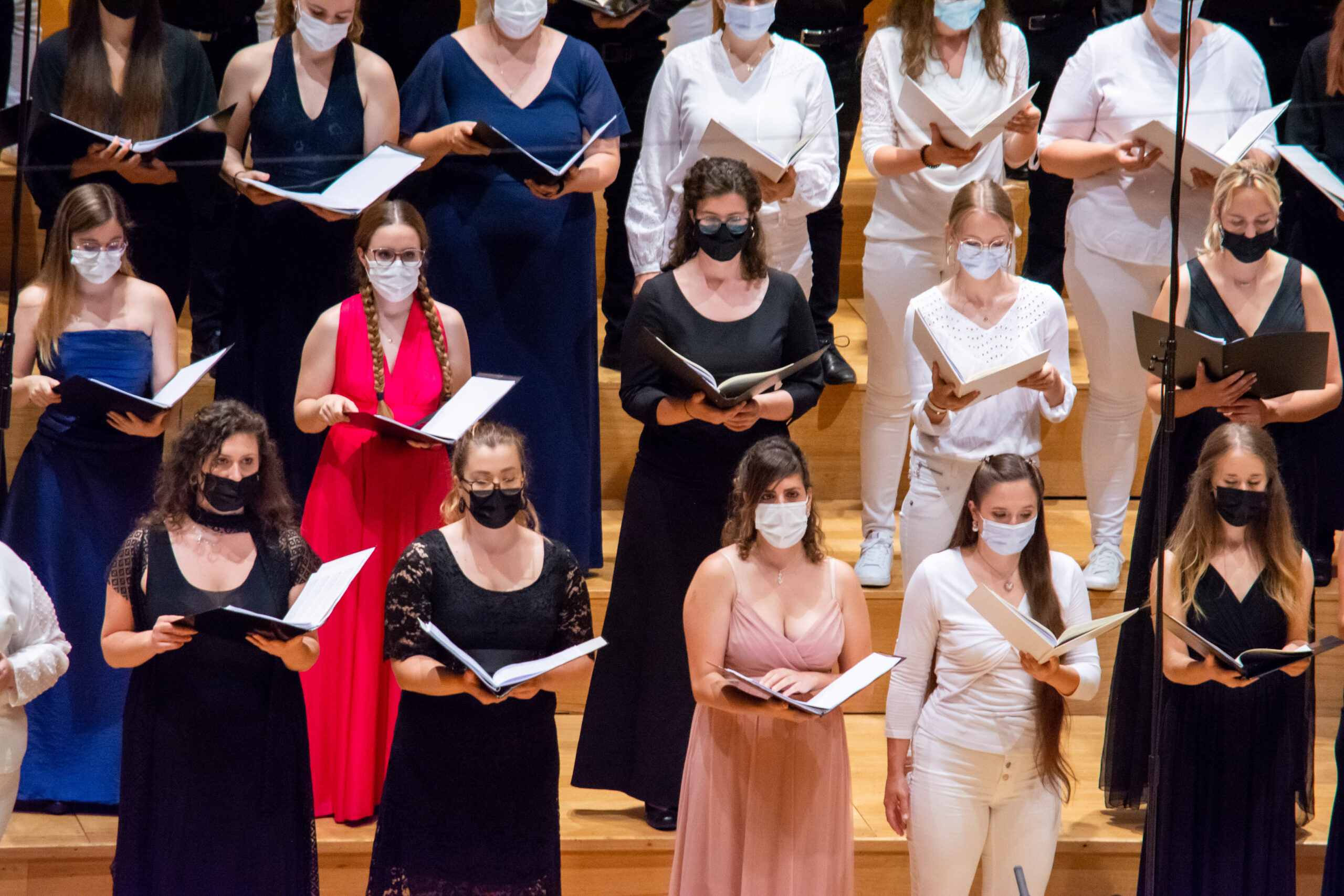
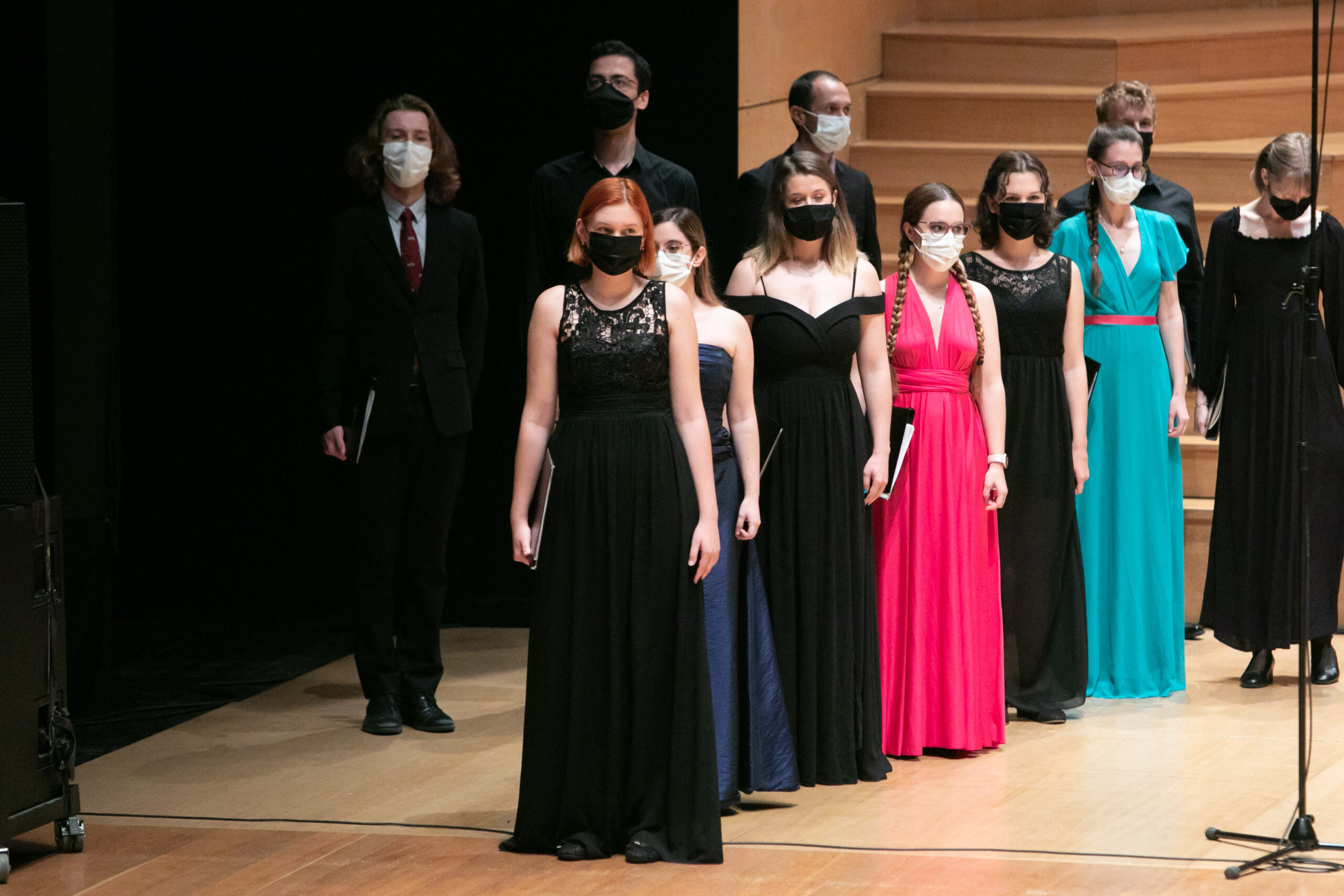
EuroChoir was rehearsing in the hall at Tabor, all four National Youth Choirs were working at the St Stanislav Institution and were not allowed to mingle with the other EC Festival participants.
It is very interesting to observe how different cultures perceive and react to Covid-19. Some participants from abroad felt that we have too lax measures, they did not feel safe. This was the reaction of the Catalans, the Irish, the Italians, the Germans… We have been able to experience how responsible some nations are about security measures. We had therefore made a conscious decision in advance to take a stricter line than the official Slovenian one, so that these singers would also feel comfortable here. On the other hand, we wanted to present our festival as an example of good practive in the sense: if the rules are set carefully and the health and safety precautions taken seriously, then it is possible to organise such an event safely. We wanted the Europa Cantat Festival to be a proof and a confirmation that this was possible. Next time we go into closure, we would like to have solid proof that choral singing, organised in this way, is no more of a threat to public health than any other of non-emergent activities. We therefore outlined to all the participants: help us create a good negotiating position, a proof, so that next season – not only in Slovenia, but also abroad – we will dispose of solid arguments to negotiate, and ensure an optimistic future to choral singing culture.
Published on August 5, 2021 in Naši zbori, Slovenian online choral magazine, nasizbori.si
